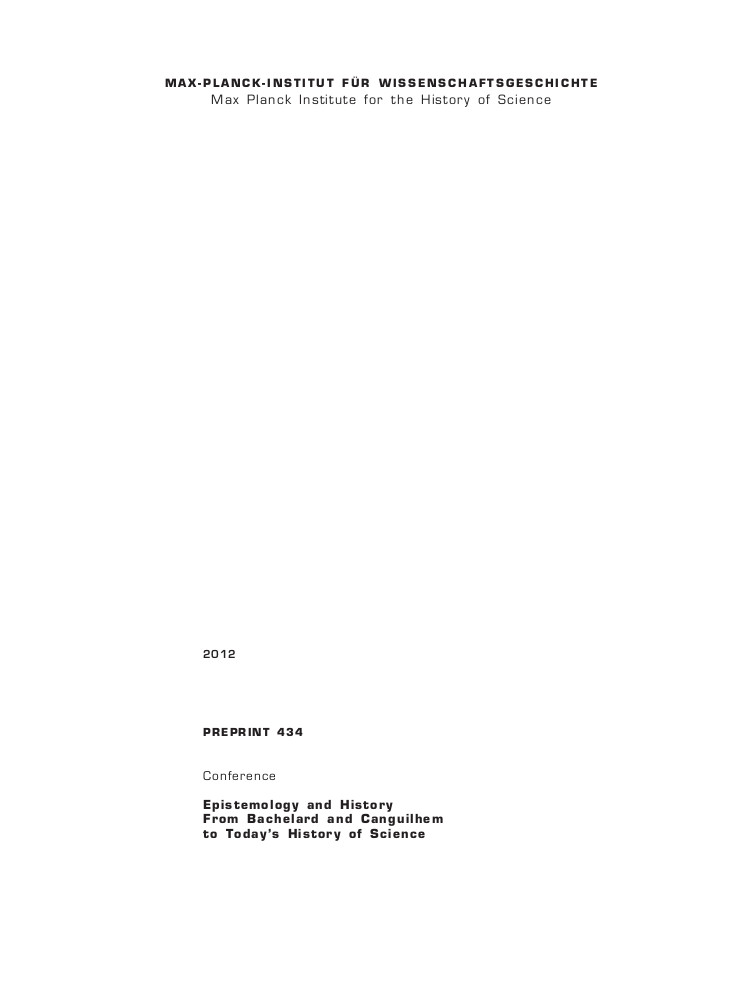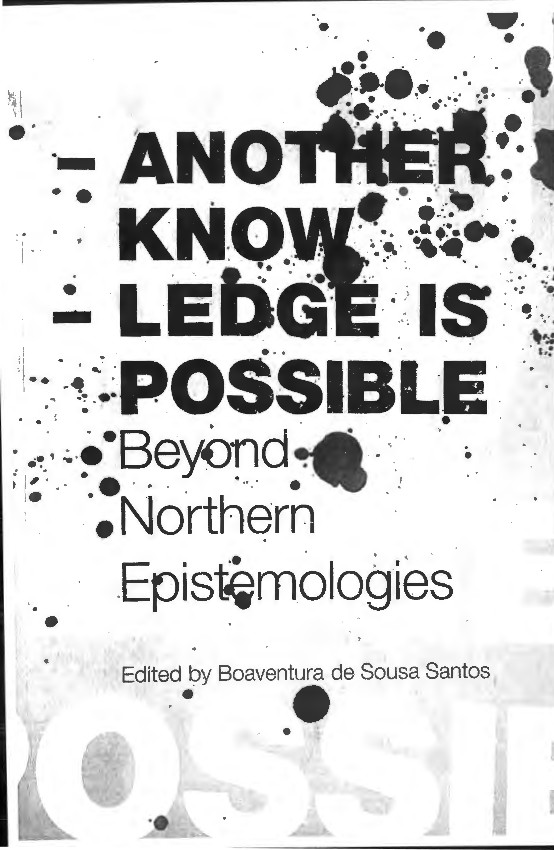Max Planck Institute (ed.): Epistemology and History: From Bachelard and Canguilhem to Today’s History of Science (2012) [EN, FR, DE]
Filed under proceedings | Tags: · discourse, epistemology, historical epistemology, history, history of science, knowledge, philosophy, science, theory

“Over the past few years, “historical epistemology” has had quite a successful international career. Starting with a week-long conference organized by Ian Hacking in Toronto in 1993, historical epistemology was and continues to be used as a label for a wide variety of projects and programs: from Hacking’s own discussion of styles of scientific reasoning to Lorraine Daston’s historicization of epistemological categories and values, Arnold Davidson’s investigations into the conceptual formation of new kinds of knowledge and experience and the attempt undertaken by Peter Damerow et al. to broaden the scope of Jean Piaget’s “genetic epistemology” by historical means.
These conference proceedings attempt to historicize and contextualize historical epistemology and, by the same token, to create a prerequisite for concrete and critical updates.” (from the Introduction)
Contributions by Camille Limoges, François Delaporte, Monika Wulz, Thomas Ebke, Stefanos Geroulanos & Todd Meyers, Claude Debru, Pierre-Olivier Méthot, Françoise Balibar, Sandra Pravica, Cornelius Borck, Andrea Cavazzini, Maria Muhle, Cristina Chimisso, Frieder Otto Wolf, and Anselm Haverkamp.
Publisher Max-Planck Institute for the History of Science, Berlin, 2012
MPG Preprint 434
Open Access
232 pages
PDF (1.4 MB)
Comment (0)Pamela H. Smith: The Body of the Artisan: Art and Experience in the Scientific Revolution (2004)
Filed under book | Tags: · alchemy, art, art history, craft, epistemology, history of science, knowledge, natural philosophy, painting, renaissance, science, scientific revolution, technique

“Since the time of Aristotle, the making of knowledge and the making of objects have generally been considered separate enterprises. Yet during the late sixteenth and early seventeenth centuries, the two became linked through a “new” philosophy known as science. In The Body of the Artisan, Pamela H. Smith demonstrates how much early modern science owed to an unlikely source-artists and artisans.
From goldsmiths to locksmiths and from carpenters to painters, artists and artisans were much sought after by the new scientists for their intimate, hands-on knowledge of natural materials and the ability to manipulate them. Drawing on a fascinating array of new evidence from northern Europe including artisans’ objects and their writings, Smith shows how artisans saw all knowledge as rooted in matter and nature. With nearly two hundred images, The Body of the Artisan provides astonishingly vivid examples of this Renaissance synergy among art, craft, and science, and recovers a forgotten episode of the Scientific Revolution-an episode that forever altered the way we see the natural world.”
Publisher University of Chicago Press, 2004
ISBN 0226763994, 9780226763996
x+367 pages
Reviews: Ashley D. West (CAA Reviews, 2004), Marjorie Harth (Pomona, 2004), Eileen Reeves (Renaissance Quarterly, 2005), William Eamon (Isis, 2006), John Henry (British Journal for the History of Science, 2006), Jonathan Sheehan (American Historical Review, 2006), Klaas van Berkel (BMGN, 2006), Trevor Marchand (Senses and Society Journal, 2008).
PDF (51 MB, updated on 2020-5-1)
Comments (2)Boaventura de Sousa Santos (ed.): Another Knowledge Is Possible: Beyond Northern Epistemologies (2007)
Filed under book | Tags: · biodiversity, capitalism, environment, epistemology, human rights, knowledge, medicine, neoliberalism, social movements

“The main argument of this book is that there is no global social justice without global cognitive justice. Probably more than ever, global capitalism appears as a civilizational paradigm encompassing all domains of social life. The exclusion, oppression, and discrimination it produces have not only economic, social, and political dimensions but also cultural and epistemological ones. Accordingly, to confront this paradigm in all its dimensions is the challenge facing a new critical theory and new emancipatory practices. Contrary to their predecessors, this theory and these practices must start from the premise that the epistemological diversity of the world is immense, as immense as its cultural diversity and that the recognition of such diversity must be at the core of the global resistance against capitalism and of the formulation of alternative forms of sociability.” (from the Introduction)
Another Knowledge Is Possible explores the struggles against moral and cultural imperialism and neoliberal globalization that have taken place over the past few decades, and the alternatives that have emerged in countries throughout the developing world from Brazil and Colombia, to India, South Africa and Mozambique. In particular it looks at the issue of biodiversity, the confrontation between scientific and non-scientific knowledges, and the increasing difficulty experienced by great numbers of people in accessing information and scientific-technological knowledge.
With contributions by Margarita Flórez Alonso, Luis Carlos Arenas, João Paulo Borges Coelho, Arturo Escobar, Yash Ghai, Maria Paula Meneses, João Arriscado Nunes, Lino João de Oliveira Neves, Mauricio Pardo, Shalini Randeria, Laymert Garcia dos Santos, Vandana Shiva, Carlos Frederico Marés de Souza Filho, Tewolde Berhan Gebre Egziabher, Shiv Visvanathan, and Thokozani Xaba.
Publisher Verso, London, 2007
ISBN 9781844672561
447 pages
via the editor, HT kris
PDF (single PDF, updated to an OCR’d version on 2014-5-9 via esco_bar)
PDF (PDF chapters)

